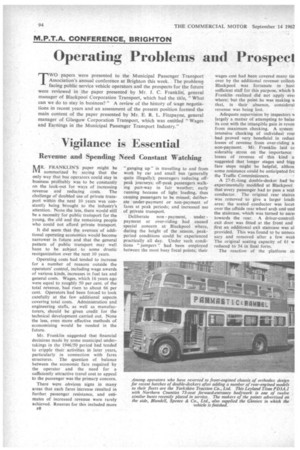Vigilance is Essential
Page 96

If you've noticed an error in this article please click here to report it so we can fix it.
Revenue and Spending Need Constant Watching
MR. FRANKLIN'S paper might be summarized by saying that the only way that bus operators could stay in business profitably was to be constantly on the look-out for ways of increasing revenue and reducing costs. The challenge of doubled use of private transport within the next 10 years was constantly being brought to the industry's attention. None the less, there would still be a necessity for public transport for the young, the old and the remaining people who could not afford private transport.
It did seem that the avenues of additional operating economics would become narrower in future and that the general pattern of public transport may well have to be subject to some drastic reorganization over the next 10 years.
Operating costs had tended to increase for a number of reasons outside the operators' control, including wage awards of various kinds, increases in fuel tax and general costs. Wages, which 16 years ago were equal to roughly 50 per cent, of the total revenue, had risen to about 66 per cent. Operators had been forced to look carefully at the few additional aspects covering total costs. Administration and engineering staffs, as well as manufacturers, should be given credit for the technical development carried out. None the less, even more effective methods of economizing would be needed in the future.
Mr. Franklin suggested that financial decisions made by some municipal undertakings in the 1946/50 period had tended to cripple their activities in later years, particularly in connection with fares structures. The question of balance between the economic fare required by the operator and the need for a sufficiently attractive travel cost to appeal to the passenger was the primary concern.
There were obvious signs in many areas that each fares increase resulted in further, passenger resistance, and estimates of increased revenue were rarely achieved. Reasons for this included more F8 "ganging up" in travelling to and from work by car and small bus (generally quite illegally); passengers reducing offpeak journeys; off-peak passengers walking part-way in fair weather; early running because of light loading, thus causing passengers to be missed; deliberate under-payment or non-payment of fares at peak periods; and increased use of private transport.
Deliberate non payment, under payment or over-riding had caused special concern at Blackpool where, during the height of the season, peak. period conditions could be experienced practically all day. Under such conditions " jumpers " had been employed between the most busy focal points; their
















































































































































































































































